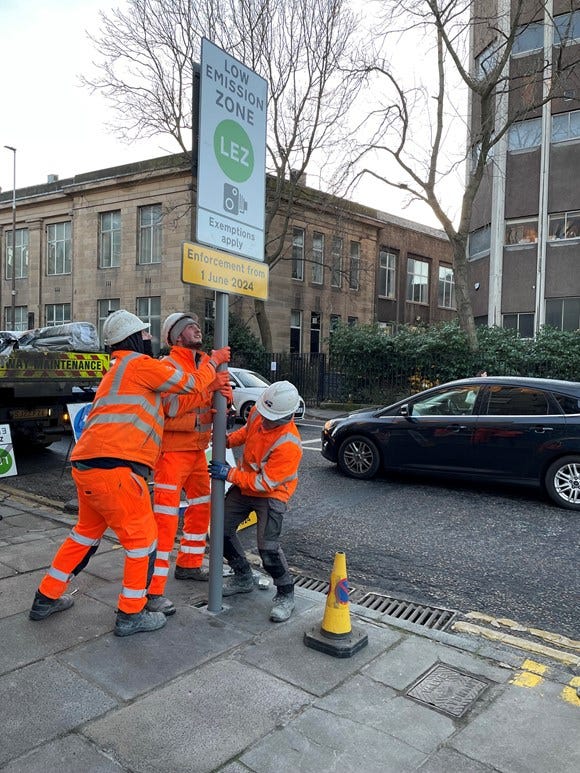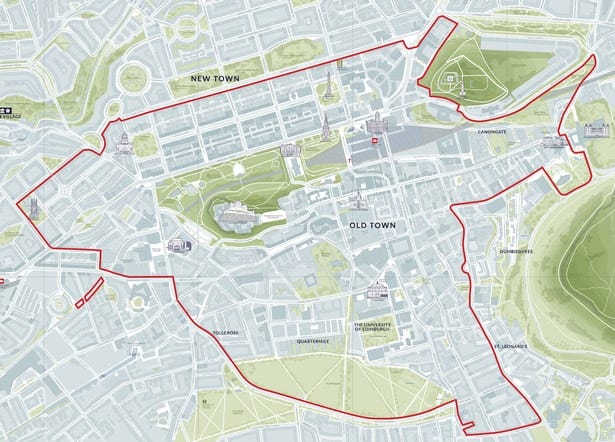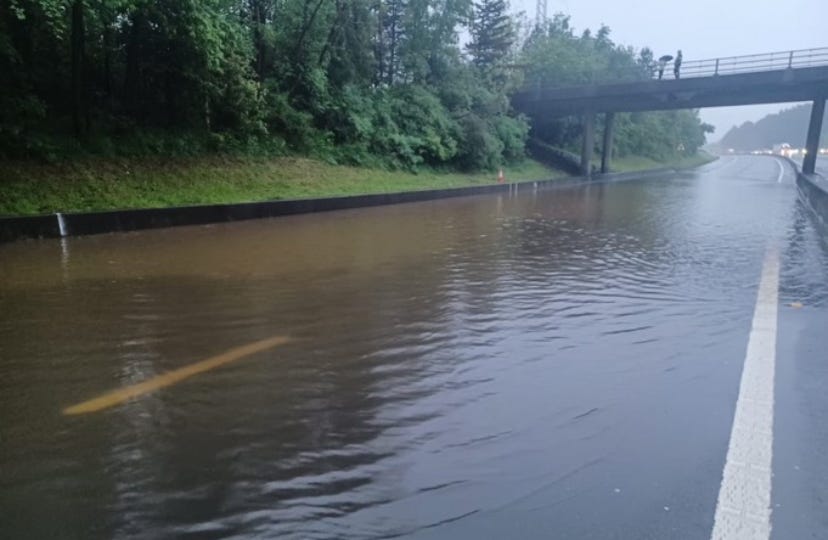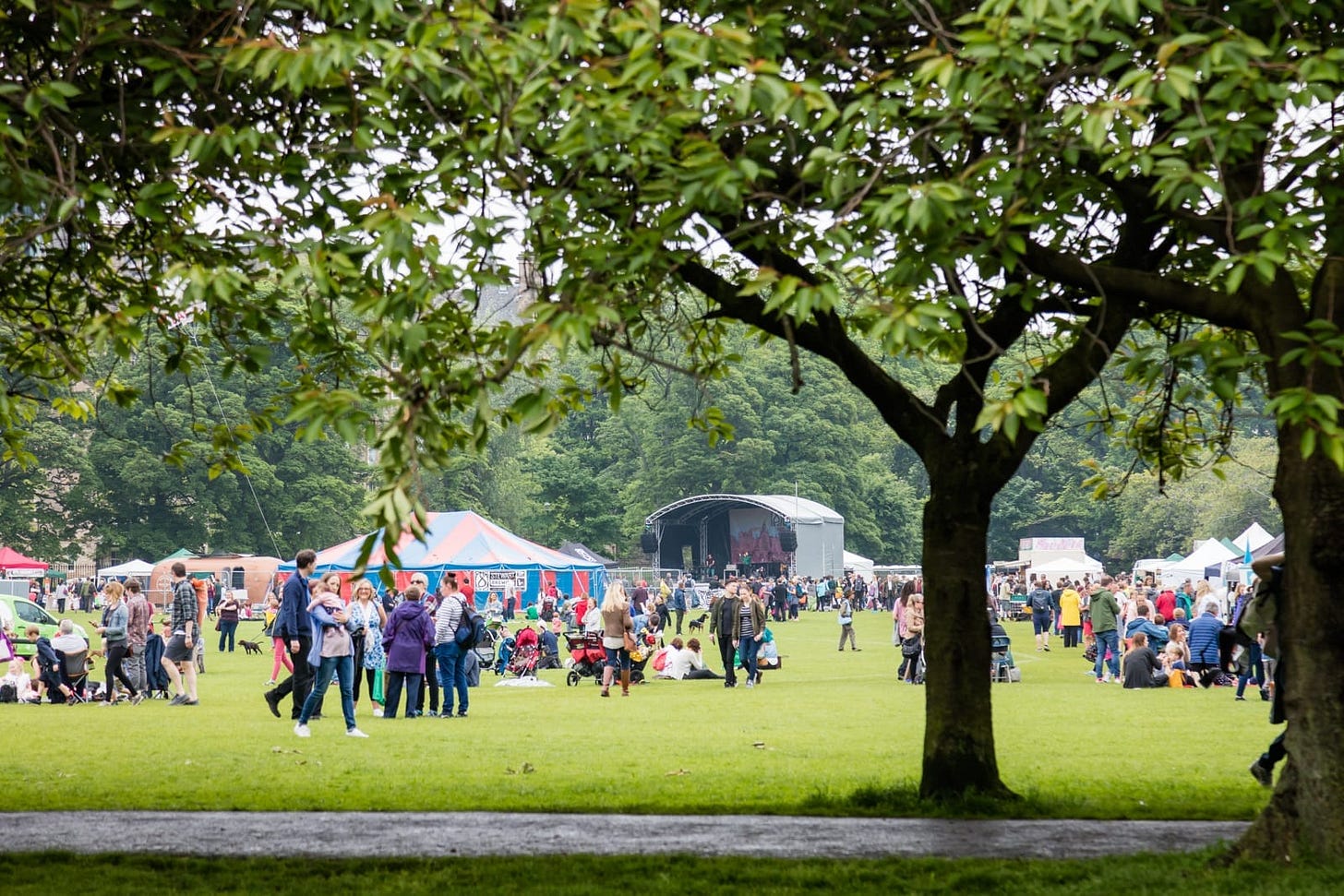The truth about Edinburgh’s LEZ
Plus: Calls to tax cruise ships visiting Capital, and literary row continues
Enforcement of city’s clean air zone starts on Saturday
After years of fierce debate and almost 20 years after the Capital rejected a congestion charge, Edinburgh is about to start enforcing a ‘clean air zone’ in the city centre.
On Saturday, Edinburgh’s Low Emission Zone (LEZ) will come into effect. The automatic number plate recognition is primed, the signs have been popping up around the charging zone for weeks, and, for some, the fines will soon be in the post.
What will it all mean? Cleaner air and better health for all? Thousands of fines? Businesses shutting down? Has Edinburgh learned the lessons of the somewhat bumpy launch of the LEZ in Glasgow?
Well, buckle up, for a fast track run through of what you should expect.
The context: Edinburgh, like many other cities, has been talking about measures to tackle levels of toxic air pollution for years. In 2005, plans for a two-cordon congestion charge were rejected in a public vote in the Capital. In the meantime, some other cities have pressed ahead, with London introducing a ‘Toxicity Charge’ in 2017, before upgrading it to a stricter ULEZ (Ultra Low Emission Zones) in 2019, and twice expanding it to cover a greater area since. In Edinburgh, long term exposure to air pollution is estimated to contribute to 205 premature deaths a year, amounting to 2,300 life-years lost, mainly through undermining the health of people with heart and lung conditions.
Will enforcing Edinburgh’s LEZ cut air pollution? Probably not, at least not significantly in the short term. In Glasgow, the city’s most polluted street, Hope Street, which is within the charging zone, actually saw pollution levels rise slightly in the first three months of the LEZ, partly due to the hot weather. The same thing could happen in Edinburgh, but that does not necessarily mean the LEZ is a failure.
All about the bus: Buses have traditionally been the worst culprits for causing city centre air pollution and the LEZ has largely tackled that already by forcing a massive investment in the council-owned Lothian bus fleet to make sure its vehicles comply. It means the benefits of the LEZ in its current form have largely been front-loaded.
Start of the journey: One of the main criticisms of Edinburgh’s LEZ is unnecessary because legal requirements for air quality are already being met in the Capital. Those targets, however, are expected to become more stringent in the coming years in line with World Health Organisation recommendations. City transport convener Scott Arthur has suggested Edinburgh’s LEZ could become stricter in time suggesting rules like electric vehicles-only could become reality at some point.
What about businesses? Some of the highest rates of non-compliance with LEZ standards have been among delivery vehicles with many small firms in particular struggling to pay for upgrades at a time when their businesses are being squeezed in the post-Covid cost of living crisis. Some grant help is available but it does not cover the full cost, leaving some firms having to contemplate cancelling deliveries or other visits to city centre addresses. There is also a concern the LEZ may more generally discourage visitors to the city centre.
What and where is included? The charging zone covers only the very centre of the city, but does not include some key routes such as Queen Street. The emission standards which need to be met to avoid £60 fines - which can escalate for repeated transgressions - are standard for most modern vehicles. It is mainly older diesel models which fail. You can check if your vehicle meets the standard here.
YOUR EDINBURGH BRIEFING
SIMPLY THE (SECOND) BEST: The consumer watchdog Which? has conducted a survey of almost 4,000 of its members to identify the best city break destination in the UK. Edinburgh beat London - and almost everywhere else - to take second place behind Liverpool. Their verdict? Five out of five for Edinburgh’s cultural attractions, four out of five for food and drink, shopping, ease of getting about, and value for money.
PARKING LEVY PARKED: City councillors have voted against taking forward plans for a Workplace Parking Levy after trade unions raised concerns about the potential impact on shift workers and fears it would displace commuter parking into residential streets. The proposals would have seen companies charged up to £650 a year per parking spaces which they could choose to pass onto employees. It had been estimated the scheme could raise up to £12m a year to fund city transport. The tax-raising scheme from a Labour-run council might not have helped its General Election prospects in Edinburgh. Could it yet make a comeback at some future date?
TRAMS CASH BLOW: Transport Secretary Fiona Hyslop has told the city council to explore private finance options for its proposed north-south tram line after warning Scottish Government funding for the plan is “not affordable in the current financial climate”. The Granton to the Royal Infirmary route would cost an estimated £2bn.
COALIE GOOD: The complete transformation of Leith’s Coalie Park has been showcased by before and after aerial photos released by the Water of Leith Conservation Trust. The three-year, community-led initiative, driven the conservation trust, includes new benches and seats, planting of new oak trees and hedgerows, floating wildlife platforms, and an upgrade of a section of the National Cycle Network.
ALL CHANGE, BY GEORGE: Plans to transform George Street into a pedestrian and cycle-friendly zone are to be reviewed after the cost of the project rose from £28m to £39.45m. Council officials are to consider whether a less ambitious scheme might provide better value for money and explore potential alternative funding sources. The plans have already been changed to allow private hire vehicles continued access to the street when general traffic is banned, alongside black cabs.
‘TERRORIST ATTACK’ FOILED: The National Crime Agency (NCA), the UK equivalent of the FBI, assisted Police Scotland investigations into “the apparent preparation for a firearms attack in the Edinburgh area”. The NCA provided forensic clinical psychologists, behavioural investigative advisors, a crime investigation support officer and interview advisors as part of Operation Ferulic into apparent terrorist offices in Edinburgh between October 2023 and March this year. The details emerged in the NCA’s annual report.
SCHOOL FEES: A 9% increase in fees at Scotland’s largest private school, George Watson’s College in Edinburgh, has been described as “eye-watering” by one parent quoted in The Times. The school has blamed “current and future financial pressures” for the rise. Sir Keir Starmer has promised to immediately impose VAT on private schools should Labour win next month’s general election.
SWIFT RETRIBUTION: The city council has been criticised for asking its staff to volunteer within their normal working hours to help visitors to the city during Taylor Swift’s money-spinnning Eras tour. Labour councillor Katrina Faccenda said: “Get the touts who masquerade as ticket agencies to cough up their profits and pay folk a shift. This is not a public occasion like Olympics or Commonwealth Games, it is a concert by a performer who is a billionaire and the tickets have been sold for vast sums.”
SOAKED AGAIN: Edinburgh and the Lothians have been hit with widespread flooding after extreme weather hit the region once again. The City Bypass (pictured) and Princes Street Gardens were among the areas which were closed during last week as a result of a month’s worth of average rainfall arriving within 24 hours.
LITERARY ROW: Edinburgh headquartered investment fund managers Baillie Gifford, a leading sponsor of the arts in this country, is in the news again. Hay Festival, one of the UK’s leading literary and book festivals, has suspended its reported £130,000 sponsorship from the firm over the asset manager’s purported links to the fossil fuel industry and alleged investment in Israeli occupied Palestine.
The firm has found itself in the line of fire of climate activists after Greta Thunberg’s withdrawal from Edinburgh International Book Festival last year in protest, and new director Jenny Niven is now expected to again come under renewed pressure to break the long-standing link with Baillie Gifford.
The firm has repeatedly pointed out that only a tiny and reducing percentage of its investments remain in fossil fuel businesses – 2% compared to the market average of 11% - and that it has much larger investments in companies seeking to drive the transition to clean energy. In the FT, Baillie Gifford also rejected claims that it is a large investor in the occupied Palestinian territories as “seriously misleading.”
THE BUSINESS
LEAVING THE NEST: Stephen Bird has announced his departure from Edinburgh headquartered Abrdn. In an update shared with investors on Friday, Abrdn said it was a mutual decision between its board and chief executive that it was the “right time” for him to depart. Jason Windsor, Abrdn’s chief financial officer, will act as interim group chief executive until the recruitment process is finished.
BAR RAISED: Edinburgh’s hospitality sector has begun gearing up to cope with the high summer demand fuelled by the Capital’s August festival season. Temporary work marketplace Indeed Flex has carried out research with shows that demand for bar staff is strong, with temporary work paying an average of £12.62 per hour.
LANDING THE BIG APPLE: US airline JetBlue has opened its new daily service connecting New York JFK and Edinburgh Airport, operating on an Airbus A321neo, and running throughout the summer until September 30, further enhancing Edinburgh’s extensive North American connectivity.
Councils drive for Cruise control as passenger numbers boom in the Capital
Councils are pushing the Scottish Government to include the growing number of cruise ships visiting the country in the incoming tourist tax. At present, the legislation covers most types of accommodation – from caravan sites to luxury hotels – but does not include cruise ships.
Forth Ports’ Capital Cruising business said a record 161 cruise visits had been booked in for 2024, across all of Scotland’s east coast ports at Edinburgh, Fife and Dundee, up from 149 the previous year. The estimated impact of the cruise sector on the Scottish economy is around £130 million in the coming year.
Capital Cruising says “91 per cent of cruise passengers repeat a cruise with 60 per cent returning to a destination. We are working hard with the city, destination partners, communities and the wider cruise industry to meet the industry's challenges and deliver another successful cruise season.”
However, Cosla, the body which represents all of Scotland’s local authorities, is now calling for a cruise ship levy given the expansion of the sector and the “growing challenges” presented by the impact of high numbers of passengers on destinations in Scotland.
Schemes have already been introduced in cities like Barcelona and Amsterdam, often seen as tourism competitors for Edinburgh.
A statement from Cosla said: “Cosla leaders continue to support the proposal for councils to have the ability to introduce a cruise ship levy as soon as practically possible. Cruise ship tourism is both a welcome source of revenue and a growing challenge for the services and facilities used by communities across our coastal councils.
"Across Scotland, overnight visitors staying on cruise ships access the same services and facilities as both visitors staying in accommodation such as hotels, as well as residents. However, cruise ship passengers fall outwith the Bill’s scope and will not be liable to pay a levy. Cosla officers and colleagues in councils have been working closely with the Scottish Government to develop a joint proposal for a cruise ship levy.”
THAT’S ENTERTAINMENT
FIELDS OF GOLD: It must be summer, because it’s Meadows Festival time. Highlights this year include stages hosted by the incredible Tonegarden and Totally Sound, sports participation area, open mic stage and dog show and greyhound parade. What’s more it’s the Festival’s 50th birthday!
FLOWER POWER: Larger than life floral portraits of artists from Annie Lennox and Alexander McQueen through to Charles Rennie Mackintosh and Rabbie Burns, it can only be the return of Fleur de Ville. The world-renowned floral sculptures of Fleur de Ville Artiste are on display from Friday until 9 June at the Royal Botanic Garden.
REVOLTING WOMEN!: Touring from Tate Britain, Women in Revolt!, a new feminist arts exhibition charting art and activism between 1970 and 1910, is now open at the Gallery of Modern Art. From punk and independent music to Greenham Common and the peace movement, the visibility of Black and South Asian women artists to Section 28 and the AIDS pandemic, the exhibition explores creativity and rebellion. National Galleries Of Scotland: Modern Two, Belford Road, until 26 January, 2025.
QUICK BITES
BOOK OPENS: Renowned Edinburgh restaurateurs the Vittoria Group has opened its first neighbourhood café bar. The Brunswick Book Club at 113 Brunswick Street offers its own take on the classic pub, with live music and quiz nights allied with popular Italian dishes and a wide selection of drinks.
BAR CLOSES: The Cocktail Mafia, in Edinburgh’s West End at Charlotte Lane, has announced its closure. In a post on its website, the owners told customers: “Sadly The Cocktail Mafia has closed its doors permanently. We do hope to return at some point and open at a new venue in the future. Watch this space and thank you for your support”.








